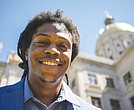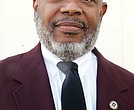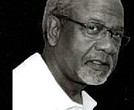Jim Webb’s ‘culture’ war
10/23/2015, 1:04 p.m.
Clarence Page
Former Virginia Sen. Jim Webb, feeling disrespected at CNN’s Democratic presidential debate in Las Vegas, says he’s dropping out to consider running as an independent. That’s his right, but I wonder whether anyone will notice.
It is well known that Mr. Webb, a decorated Vietnam combat veteran, former secretary of the Navy under President Ronald Reagan and author of numerous books, has two flaws for an aspiring politician: He doesn’t care much for campaigning and he really hates asking people for money.
As a result, his polling numbers hover around an unimpressive 1 percent.
And, as we saw on the Las Vegas debate stage, he really hates to be ignored when he has more to say. Instead of using his valuable airtime to give millions of television viewers a good first impression of himself, he wasted time by bellyaching that CNN’s moderator Anderson Cooper was not giving him enough time.
Note to aspiring pols: It is not the amount of your airtime that matters; it is how well you use it.
Mr. Webb is more interesting than most also-rans this season. His conservative streak offers Democrats their best chance to lure the so-called “Reagan Democrats,” mostly middle class and blue-collar white males, back to the Democratic Party that they used to dominate.
As Mr. Webb writes in his fascinating 2004 book, “Born Fighting: How the Scots-Irish Shaped America,” Democrats foolishly wrote off Southern white males in what Mr. Webb calls the mistaken belief that they were a necessary cost of President Lyndon B. Johnson’s civil rights reforms.
“And for the last 50 years,” Mr. Webb wrote, “the Left has been doing everything in its power to sue them, legislate against their interests, mock them in the media, isolate them as idiosyncratic and publicly humiliate their traditions in order to make them, at best, irrelevant to America’s future growth.”
As a conservative Democrat, Mr. Webb properly belongs somewhere in between the two parties. Unfortunately for him, as liberal Texas activist Jim Hightower likes to say, these days there’s “nothing in the middle of the road except a yellow line and dead armadillos.”
Republicans have flocked to Donald Trump, Ben Carson and Carla Fiorina, each of which is notable for racing to the political right ideologically and for never having held elective office.
And Democratic frontrunner Hillary Rodham Clinton has lurched to the left to fend off the surprising popularity of U.S. Sen. Bernie Sanders of Vermont, an avowed “democratic socialist.”
Yet as Mr. Webb expresses in his historical study of the role his fellow Scots-Irishmen played in U.S. history — varying from Andrew Jackson to Ronald Reagan, Bill Clinton and beyond — the Virginian feels attracted to fights for seemingly lost causes.
That would explain why in 2010 he jumped into the touchy topic of affirmative action with a Wall Street Journal op-ed headlined, “Diversity and the Myth of White Privilege.”
Mr. Webb actually defends affirmative action for African-Americans in his essay, based on historical reasons dating back to slavery and Jim Crow segregation. But he opposes expanding it to other “people of color,” which includes everybody but white people. America still owes a debt to its black citizens, but government programs to help all “people of color” should end, he declares.
That’s a nice principled position, but politically it’s self-defeating. It gains him little ground with African-Americans to fight for what’s left of affirmative action and it angers everybody else, particularly white people who feel — rightly or wrongly — that they already are getting the short end of government programs.
Yet Mr. Webb’s quest has been worth watching for his efforts to bridge a gap that has befuddled liberals for decades: Why do so many low-income people vote against their own economic self-interests?
Mr. Webb’s 2006 campaign adviser, David “Mudcat” Saunders, expressed it well in an interview with The New Yorker for a Webb profile: “Do you ever consider that there might be a powerful force at work, and that it’s driving these people to vote against their economic self-interest?” Mr. Saunders said. “I’m telling you, it’s there. It’s called culture.”
Indeed, right or left, people vote for more than their economic interests alone. Most of all, they like to be asked.







